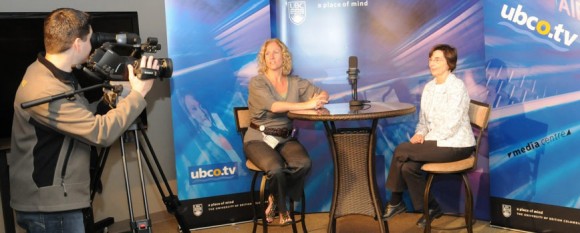
Jeff Myers and Rosemary Thompson from the Media Centre sits down to discuss the capabilities of the newly opened space with Gwen Zilm, AVP Learning Services
YouTube’s slogan boasts “Broadcast Yourself.” The slogan at UBC’s Okanagan campus could soon become “Broadcast your Learning” with the emergence of the Learning Services Media Centre and its emphasis on teaching and learning new media skills.
“It truly is a collaborative learning environment for everyone on campus,” says Gwen Zilm, AVP Learning Services, describing the Media Centre as a place “where students can take workshops in all aspects of video production, receive assistance in the planning, the producing, the editing, the file management and the broadcasting of videos, and where faculty can collaborate with creative and technical staff in the design of media-based assignments.”
With the support of both the Barber School of Arts and Sciences and the Faculty of Creative and Critical Studies, professors Daniel Keyes and Jessica Stites Mor have been working with staff in the Media Centre to develop a series of workshops and teaching tools that will enable students to create projects using cutting-edge digital communication technologies.
The Media Centre in this phase of the project has made available a studio and teaching lab with 12 editing suites, high-definition cameras, portable hard drives and production support staff assistance for students in open lab sessions throughout the week.
A project to integrate digital media with humanities learning was enabled by a Curricular Innovation Award from the Irving K. Barber endowment to Stites Mor, a faculty member in the Irving K. Barber School of Arts and Sciences. Students in one of her courses are now producing historical documentaries as part of their course work — and a new course next spring will explore the impact of digital media on the humanities via creative production.
Professor Denise Kenney from Creative Studies joined the project this fall to involve her Interdisciplinary Performance and Film Studies students in the initiative and will deliver an interdisciplinary documentary production course in January.
This fall, Keyes is offering “Television Studies,” a third-year English and Cultural Studies course supported by the Centre.
“This new support for learning allows students to critically think using video, and thus expands students’ repertoire beyond the typical essay and seminar presentation,” says Keyes. “Many of my undergraduate students make and share videos; this new resource will enhance their skills as videographers and allow them to find new ways to connect those skills to learning objectives in the classroom.”
In a group project in Keyes’ course titled “Make TV,” students will make a 30-second public service announcement for broadcast on UBCO.TV and thus learn how the production and reception of media content is shaped.
Stites Mor’s new course, entitled “Digital Media and the Humanities,” teaches digital media history, theory, and method through conversation in a community of practice and basic hands-on skill development.
“This is a truly radical way to teach the Humanities, pushing the boundaries of what we consider to be the scholar’s toolkit for inquiry and disseminating knowledge to reflect the new realities of our hyper-mediated digital culture,” says Stites Mor. The course examines the history of historical filmmaking and digital media activism and will also include a lecture series with well-established scholar-activist filmmakers open to the public.
Stites Mor notes that this collaborative project between faculty and the Media Centre delivers to students basic media understanding and skills so critical to today’s information-driven political landscape, while at the same time allowing them a close-range perspective on the structural and technological dilemmas inherent in new media environments.
“The project confronts what has often been lauded as the great ’emancipation’ of the internet age, asking students to both develop and test their understandings of and their agency within public cyber-spaces,” she says. “Students will explore how electronic media was historically designed to expand, but also sometimes to limit, democratic participation in civil society.”
“In the 21st century, the Humanities have a golden opportunity to assert its relevance via this technology,” says Keyes. “I am grateful for UBC’s support for this pilot project.”
Keyes, Stites Mor and Kenney plan to continue working with the Media Centre to move into the next stage of the project’s interdisciplinary collaboration in 2011-2012.
— 30 —